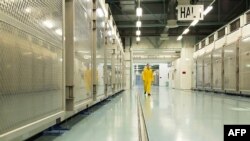Iran has told the U.N. nuclear watchdog it plans to enrich uranium to 20% purity, a level it achieved before its 2015 accord, at its Fordow site buried inside a mountain, the agency said Friday.
The move is the latest of several recent announcements by Iran to the International Atomic Energy Agency that it plans to further breach the deal, which it started violating in 2019 in retaliation for Washington's withdrawal from the agreement and the reimposition of U.S. sanctions against Tehran.
This step was one of many mentioned in a law passed by Iran's parliament last month in response to the killing of the country's top nuclear scientist, which Tehran has blamed on Israel. Such moves by Iran could complicate efforts by U.S. President-elect Joe Biden to rejoin the deal.
"Iran has informed the Agency that in order to comply with a legal act recently passed by the country's parliament, the Atomic Energy Organization of Iran intends to produce low-enriched uranium [LEU] up to 20 percent at the Fordow Fuel Enrichment Plant," the IAEA said in a statement.
An IAEA report to member states earlier Friday obtained by Reuters used similar wording in describing a letter by Iran to the IAEA dated December 31.
"Iran's letter to the Agency ... did not say when this enrichment activity would take place," the IAEA statement said.
Fordow was built inside a mountain, apparently to protect it from aerial bombardment, and the 2015 deal does not allow enrichment there. Iran is already enriching at Fordow with first-generation IR-1 centrifuges.
Iran has breached the deal's 3.67% limit on the purity to which it can enrich uranium, but it has gone up only to 4.5% so far, well short of the 20% it achieved before the deal and the 90% that is weapons-grade.
The deal's main aim was to extend the time Iran would need to produce enough fissile material for a nuclear bomb, if it chose to, to at least a year from roughly two to three months. It also lifted international sanctions against Tehran.
U.S. intelligence agencies and the IAEA believe Iran had a secret, coordinated nuclear weapons program that it halted in 2003. Iran denies ever having had one.





